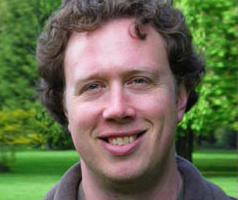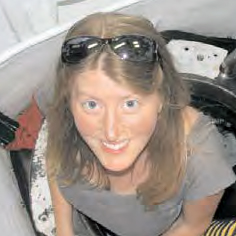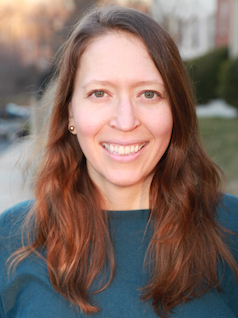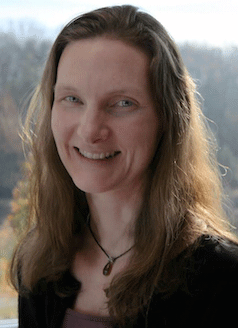Knauss legislative fellowships in Congress help build careers — and they're fun and educational. See our video and fact sheet for details.
Knauss Fellowship Alumni: Where Are They Now?
| "The Knauss fellowship gave me the opportunity to shift my career from research to policy and the skills to successfully compete for federal policy jobs." — Pamela Toschik, U.S. Fish and Wildlife Service |
Maryland Sea Grant has supported more than 50 Knauss Marine Policy Fellows since 1982.
Many have gone on to hold exciting positions in marine conservation, management, and research.
Here, four of our alumni offer brief highlights of how their fellowships helped to advance their careers — and some key memories of their fellowship experiences.
Olaf Jensen
 Knauss Fellowship: NOAA, Biogeography Program, 2003
Knauss Fellowship: NOAA, Biogeography Program, 2003
Current Job: Assistant Professor, Rutgers University, Institute of Marine and Coastal Sciences
How did your Knauss fellowship help your career?
The Knauss fellowship was a tremendous benefit to my career through development of new scientific skills, expanding my professional network, and experience working in collaborative teams. I greatly expanded my GIS and spatial analysis skill set by working alongside experienced GIS programmers. I also learned new field research techniques such as underwater fish and coral survey methods.
Some of the most important skills that I developed as a Knauss Fellow came through working in collaborative teams to provide scientific advice for management of marine sanctuaries. As a data analyst on these teams, I learned how to set realistic goals and timelines, communicate with the clients (sanctuary managers), and work effectively with scientific data providers. All of these skills are great assets whether you work in government, the private sector, or a research university (as I do now).
What is your favorite memory of your fellowship?
On the last dive of a week-long field research trip off of Puerto Rico, we were surveying bottom habitat and fish communities through visual observation while SCUBA diving. Our last site was a low visibility sea grass site. At one point, I saw a large object swimming behind me and to my left, which surprised me as I knew my dive buddy was on my right. I turned my head and was face to face with a manatee. The manatee looked as surprised as I was and it turned around and took off leaving a cloud of sediment. Luckily, when you're diving, no one can hear you scream.
Rebecca Holyoke
 Knauss Fellowship: NOAA Office of National Marine Sanctuaries, 2009
Knauss Fellowship: NOAA Office of National Marine Sanctuaries, 2009
Current Job: Program Analyst, NOAA Office of National Marine Sanctuaries
How did your Knauss fellowship help your career?
The fellowship provided me the opportunity to transition from academia to science administration, including program planning and marine policy. The network of professionals, and the informal and formal training arranged through the fellowship and my host office, greatly enhanced my skill set and knowledge of the agency — both of which were essential for earning my current position.
What is your favorite memory of your fellowship?
My favorite was participating in the NOAA Fisheries and Office of National Marine Sanctuaries National Summit near Monterey Bay, California. Preparing for and participating in this meeting introduced me to more than 80 amazing and talented staff and reinforced for me personally the need to build durable, positive relationships within and external to your program to further the many needed missions associated with ocean conservation.
Kristin Rusello
 Knauss Fellowship: NOAA National Ocean Service, Office of Response and Restoration, 2005
Knauss Fellowship: NOAA National Ocean Service, Office of Response and Restoration, 2005
Current Job: Foreign Affairs Specialist, NOAA National Marine Fisheries Service
How did your Knauss fellowship help your career?
The fellowship opened the door to the federal government for me, specifically NOAA, and allowed me to begin real-world policy work. Although I had taken policy courses in college, my focus had always been on science. The fellowship also showed me how science contributes to policy and management and gave me a better understanding of each discipline. I was also introduced to a number of U.S. agencies and executive branch engagement with the legislative branch. The fellowship allowed me "try out" the federal government in a way to determine if it was a good fit for me, which it was! I've been at NOAA for over 10 years now!
What is your favorite memory of your fellowship?
One very cool thing I was able to work on during my fellowship was the Anacostia River watershed. My M.S. work focused on restoration projects along the Anacostia River, and the NOAA Office of Response and Restoration worked on urban watershed restoration, so I was able to continue work on the river, only from a different perspective.
Pamela Toschik

Knauss Fellowship: National Science Foundation, Office of Polar Programs, 2004
Current Job: Chief, Migratory Birds, U.S. Fish and Wildlife Service, Northeast Region
How did your Knauss fellowship help your career?
The fellowship gave me the opportunity to shift my career from research to policy and the skills to successfully compete for federal policy jobs. I was introduced to international conservation treaties, and given opportunities to build my skills in consensus building. These experiences prepared me well for the next decade working in the NOAA Office of International Affairs and now with the U.S. Fish and Wildlife Service.
What is your favorite memory of your fellowship?
My favorite work as a fellow was with a small international team of avian and fisheries scientists, working to improve rules to prevent bycatch of albatrosses and petrels in Antarctic fisheries. For me, it was the ideal convergence of diplomacy, science, industry, and conservation.





